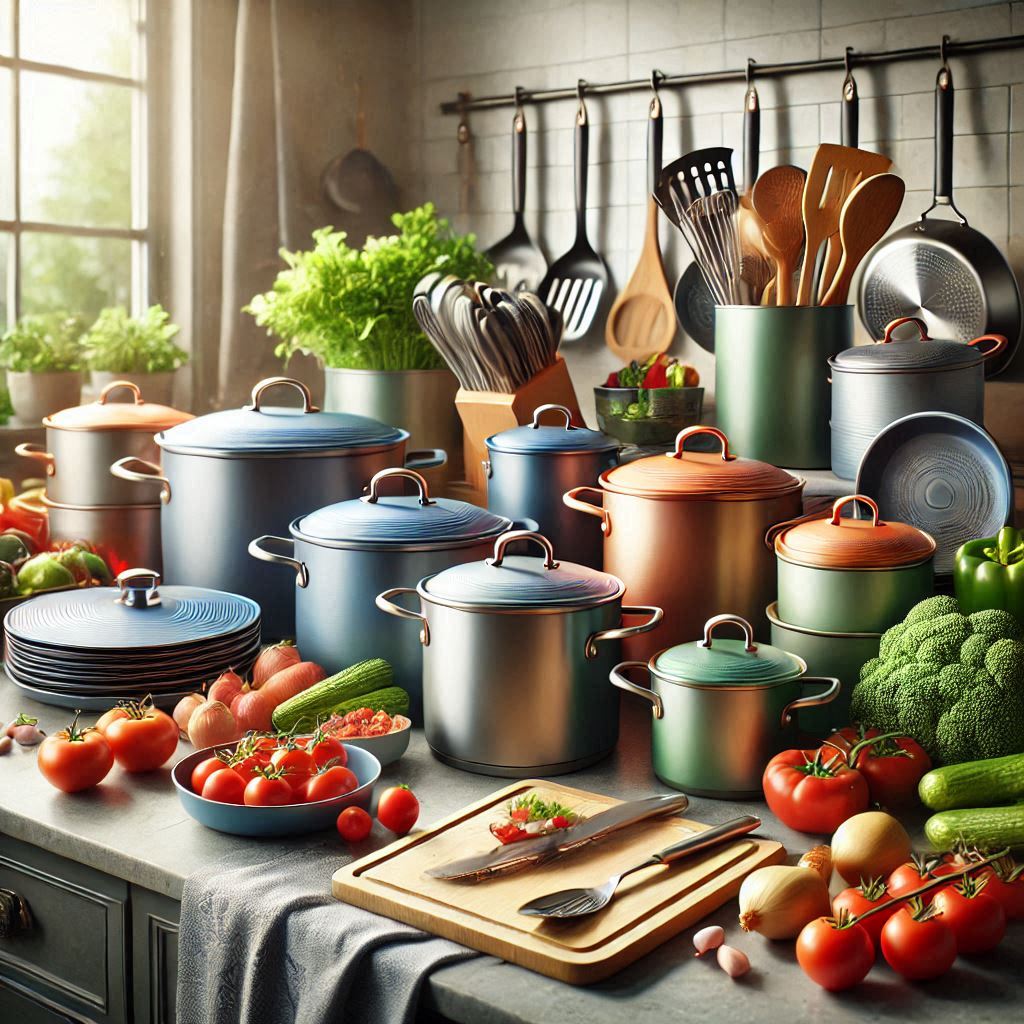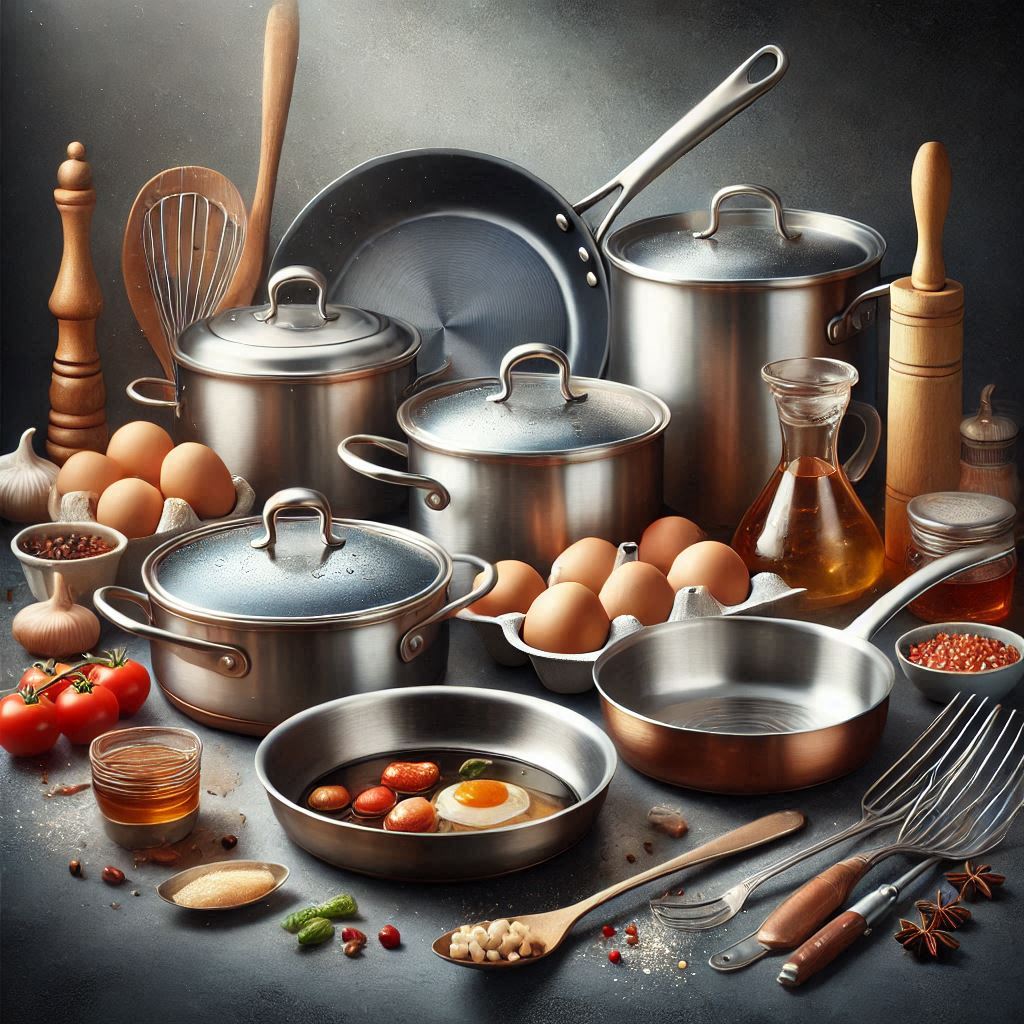If you’re diving into the world of high-end cookware, chances are you’ve come across Demeyere’s Apollo and Atlantis lines. Both are premium options under the Demeyere umbrella, but they’re designed with distinct purposes and users in mind.
As someone who’s cooked with both, let me break it down for you. By the end of this article, you’ll know exactly which one belongs in your kitchen.
Demeyere Apollo vs. Atlantis: Quick Comparison
Here’s a side-by-side comparison to set the stage:
| Feature | Demeyere Apollo | Demeyere Atlantis |
|---|---|---|
| Construction | 3-Ply & 5-Ply Hybrid Design | 7-Ply Fully Clad |
| Performance Focus | Lighter & Budget-Friendly | Maximum Heat Control & Durability |
| Best For | Casual and Intermediate Cooks | Serious Home Chefs and Professionals |
| Oven Safety | Up to 300°C/572°F | Up to 300°C/572°F |
| Price Range | $$ (Mid-Premium) | $$$$ (High-End) |
1. Core Construction: What’s Under the Hood?
The biggest difference between Apollo and Atlantis is in the construction.
Apollo: Simplified Multilayer Build
The Apollo series uses a mix of 3-ply and 5-ply technology depending on the piece. The bases often have thick aluminum cores sandwiched between stainless steel, offering good heat distribution and a lightweight feel.
It’s a great option if you’re new to premium cookware or don’t need the top-tier engineering of the Atlantis line.
Atlantis: 7-Ply Masterpiece
Atlantis is where Demeyere flexes its muscles. Every piece in the Atlantis line features a 7-layer (7-ply) construction, which includes stainless steel, aluminum, and a core layer of copper or silver (in some models). This design offers unmatched heat distribution and responsiveness.
It’s heavier than Apollo, but that weight translates into better heat retention and a sturdier feel.
2. Heat Performance: Distribution vs. Retention
Here’s where you’ll notice the most significant differences if you’re paying attention while cooking.
Apollo: Good, but Not Elite
Apollo cookware distributes heat well and heats up relatively quickly. However, the hybrid construction doesn’t offer the same evenness as Atlantis. While it’s great for everyday cooking, you might notice hot spots during tasks like searing or browning.
Atlantis: A Heat Control Champion
Atlantis cookware is engineered for perfect heat distribution. Its 7-ply construction eliminates hot spots, making it a dream for high-precision cooking. Whether you’re simmering a delicate sauce or searing steak, the Atlantis delivers professional-level performance.
Pro Tip: If you cook on induction, both lines work, but Atlantis’s efficiency on induction stovetops is unparalleled.
3. Weight and Handling: Light vs. Heavy
How do they feel in your hands? It’s a big deal if you’re moving pans around all day.
Apollo: Lightweight and User-Friendly
Apollo is lighter, which makes it easier to handle. If you’re someone who loves cooking but doesn’t want to wrestle with heavy pots and pans, Apollo is a great choice.
Atlantis: Solid and Substantial
Atlantis pans are heavier—there’s no getting around it. But that weight is what gives it the edge in heat retention and cooking performance. For serious cooks, the heft of Atlantis is a welcome feature, not a downside.
4. Cooking Versatility: What’s Your Style?
Your cooking habits will help determine which line suits you best.
Apollo: Everyday Versatility
Apollo shines in day-to-day cooking. It’s perfect for frying, sautéing, boiling, and even light baking. If you’re making family meals or experimenting with new recipes, it’s got you covered.
Atlantis: Precision and Durability
Atlantis is built for cooks who demand precision. It handles tasks like caramelizing onions or reducing sauces with ease. The even heat distribution ensures you won’t burn or undercook your food.
Plus, Atlantis cookware is almost indestructible, making it an excellent choice for anyone who spends a lot of time in the kitchen.
5. Maintenance: How Much Work Are You Willing to Put In?
Apollo: Lower Maintenance
Apollo’s stainless steel is high-quality and easier to maintain compared to Atlantis. If you accidentally burn food, a quick soak and scrub will usually do the trick. Plus, its polished finish holds up well with regular use.
Atlantis: Slightly Higher Maintenance
Atlantis cookware also features a polished stainless steel finish, but its 7-ply construction requires a bit more care to maintain its pristine look. Burnt food can be a hassle to clean, and you’ll want to avoid abrasive tools to keep the surface scratch-free.
6. Price: How Much Are You Willing to Spend?
Let’s not dance around it—Atlantis is expensive. Apollo is more budget-friendly, but you’re also sacrificing some features.
- Apollo: A great entry point to Demeyere’s world. Prices start at around $150 for smaller pieces, and full sets are relatively affordable.
- Atlantis: Premium pricing. Individual pieces often exceed $300, and full sets can cost over $1,500. But it’s an investment in durability and performance.
Which Line Should You Choose?
Still not sure? Here’s a cheat sheet:
| Choose Apollo If… | Choose Atlantis If… |
|---|---|
| You’re a casual or intermediate cook | You’re a serious home chef or professional |
| You want high-quality cookware at a lower price | You demand the best in heat control and durability |
| You prefer lighter cookware | You don’t mind heavier pans for better performance |
| Your focus is on basic stovetop cooking | You cook a variety of dishes requiring precision |
Final Verdict: My Personal Take
Here’s my honest opinion after cooking with both:
If you’re just starting out with premium cookware or want something more affordable, Apollo is the way to go. It’s high-quality, versatile, and doesn’t break the bank.
But if you’re ready to invest in cookware that will last a lifetime and give you professional-level results, Atlantis is unbeatable. Yes, it’s pricey, but the performance and durability are second to none.
For me? I use Apollo for quick, everyday meals and Atlantis when I’m cooking something special—or when I want to feel like a pro in my own kitchen.












Leave a Reply